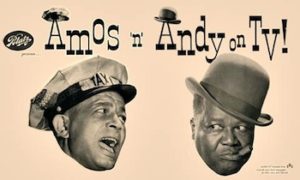
On this date in 1951, the Amos'n' Andy television show premiered.
One of the most popular and long-running radio programs of all time was adapted for television and produced by Freeman Gosden and Charles Correll, the two actors who had created and starred in the original radio version. Since they were white, a four-year search took place to find the right actors to play the parts. Only Ernestine Wade and Amanda Randolph were brought over from the radio cast.
Set in Harlem, Amos 'n' Andy centered on the activities of George Stevens, played by Tim Moore, a conniving character who was always looking for a way to make a fast buck. As head of the Mystic Knights of the Sea Lodge, where he held the "Kingfish" position, he got most lodge brothers involved in his schemes. That put him at odds with them, his wife Sapphire, and her mother. Mama, in particular, didn't trust him at all. Andy Brown was the most gullible of the lodge members, a husky, well-meaning, but rather trouble-free man played by Spencer Williams. The Kingfish constantly tried to double-cross him in one way or another, but the "big dummy" (as Kingfish called him) kept coming back for more.
More often than not, Kingfish would get them both into trouble, but win Andy's cooperation with an appeal to fraternal spirit — "Holy mackerel, Andy! Remember, we are brothers in that great fraternity, the Mystic Knights of the Sea." Amos was a rather minor character, the philosophical cab driver who narrated most episodes. Madame Queen was Andy's girlfriend, and Lightnin' was the slow-moving janitor at the lodge. Civil rights groups had long protested the series as promoting racial stereotypes. Still, Amos'n' Andy drew sizable audiences during its two-year CBS run and was widely rerun on local stations for the next decade.
The turning point came in 1963 when CBS Films, still referring to Amos'n' Andy as one of its most widely circulated shows, announced that the program had been sold to two African countries, Kenya and Western Nigeria. Soon afterward, an official of the Kenya government announced that the program would be banned in his country. This refocused attention anew on the old controversy, and in the summer of 1964, when a Chicago station announced that it was resuming reruns, widespread and bitter protests ensued again. CBS found its market for the films suddenly disappearing, and in 1966, the program was withdrawn from sale as quietly as possible.
There was no agreement on whether the program was racist. The creators certainly didn't think so, yet the humor stemmed from the fact that these were work-shy, conniving, not-too-bright Black individuals. The very stereotypes that had so long been unfairly applied to an entire race were used throughout. The last telecast of Amos 'n' Andy was on June 11, 1953.